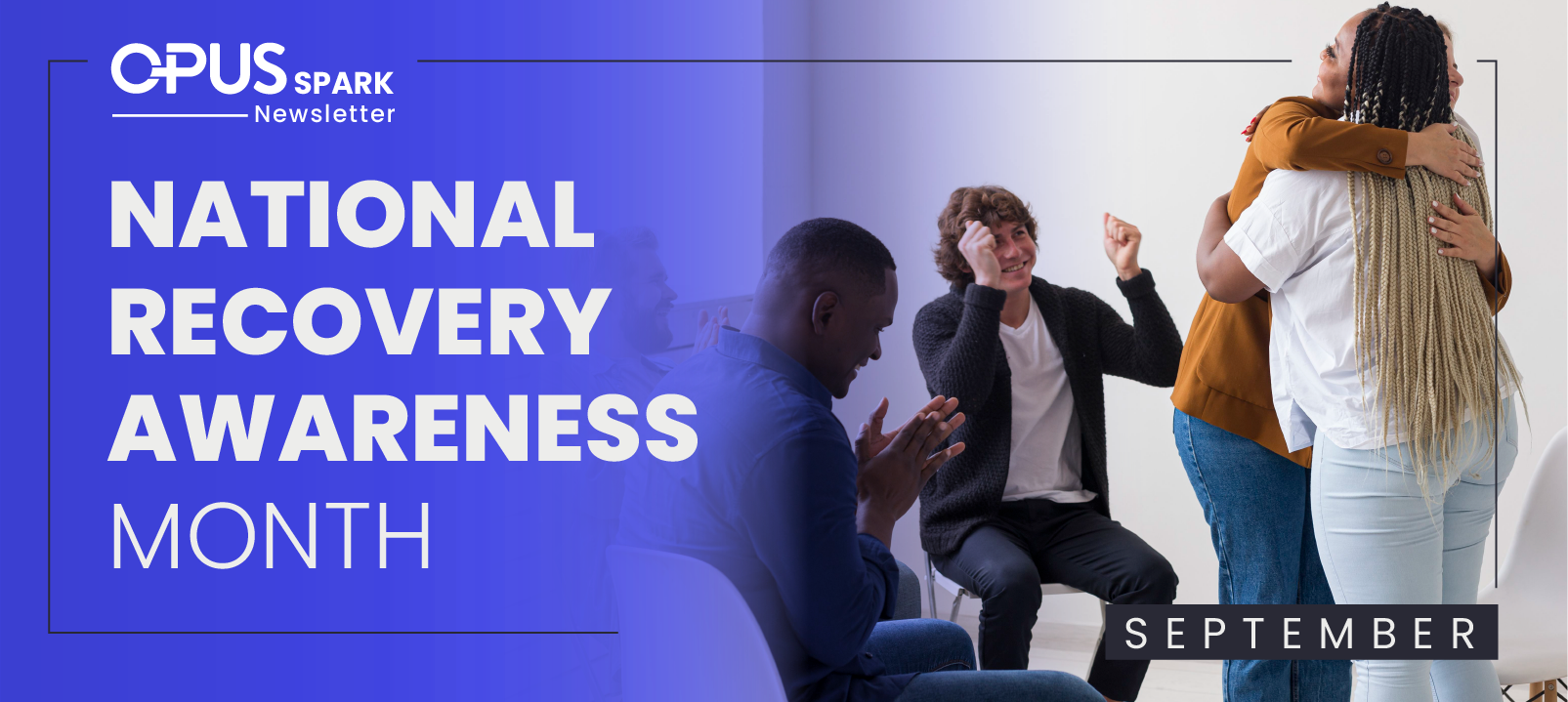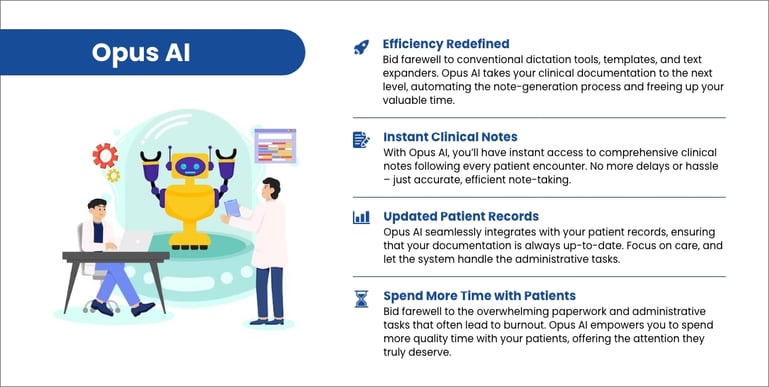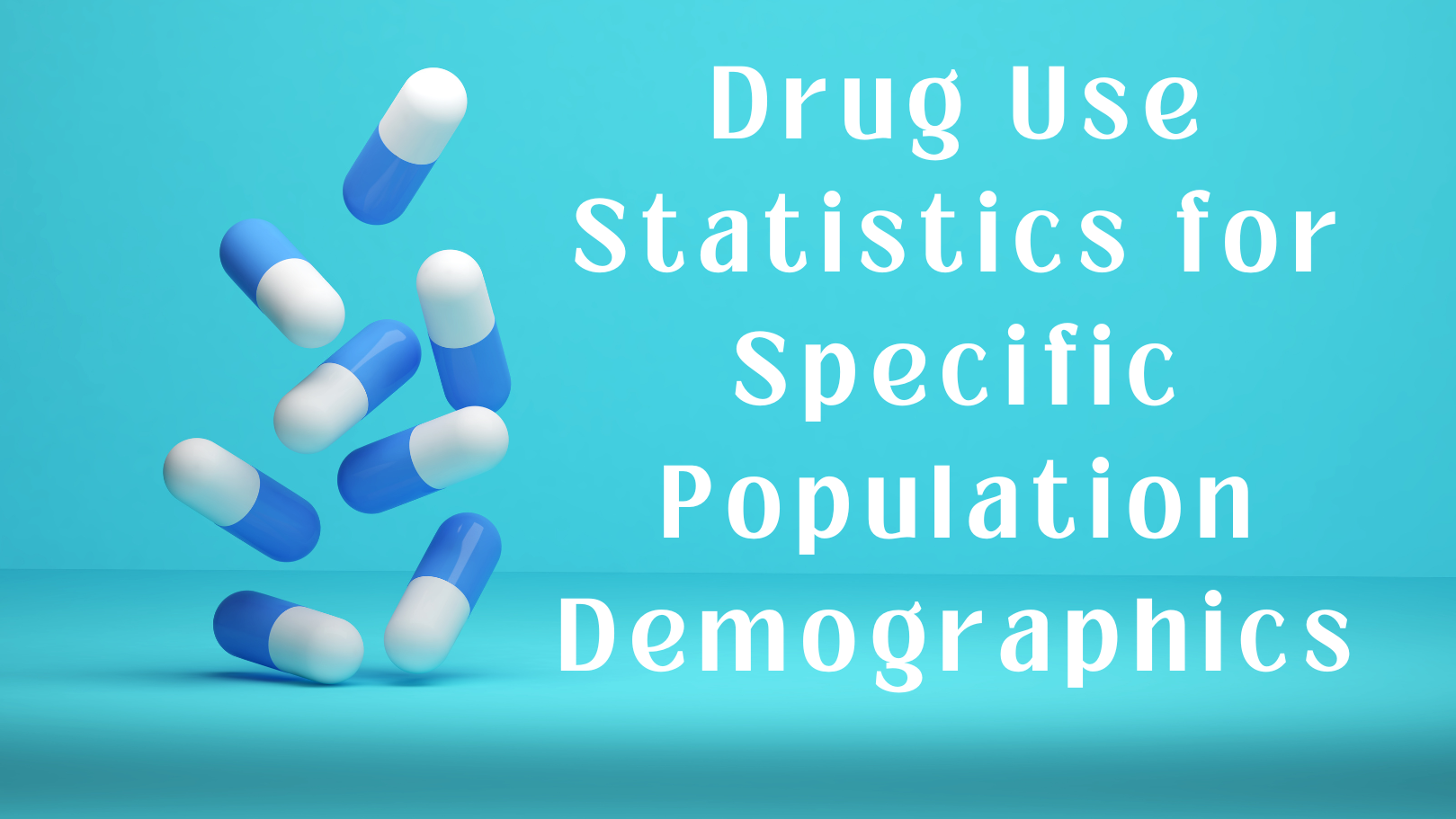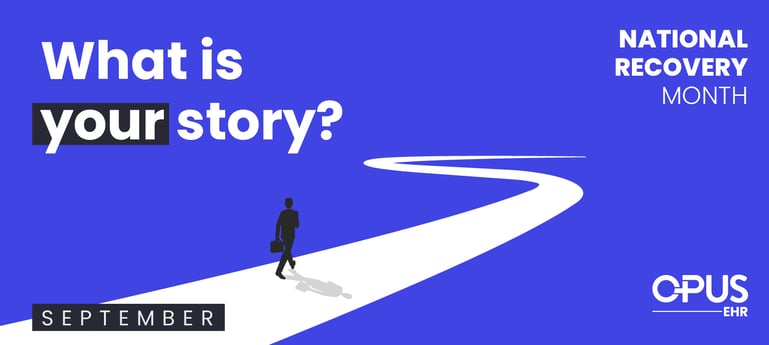
Opus Spark Newsletter - National Recovery Awareness Month
At Opus EHR, we've always believed that the work done by addiction treatment professionals and behavioral health clinicians is nothing short of heroic. Your unwavering commitment to providing hope, guidance, and life-saving techniques to individuals on their journey to recovery is a testament to the immense impact you have on countless lives.
You are the unsung heroes of our communities.
National Recovery Month serves as an important reminder of the vital role you play in helping individuals break free from the chains of addiction and regain control of their lives. Your dedication does not go unnoticed, and your efforts are deeply appreciated.
As we celebrate this month, we want to express our heartfelt gratitude to our clients, potential clients, and everyone in the addiction treatment space who tirelessly work towards making recovery a reality for so many. Your passion and resilience inspire us daily, and it's an honor to support your noble mission.
Opus EHR is here to be your partner in success. Our mission is to provide you with the tools, resources, and support needed to optimize your operations through our innovative systems. We understand the unique challenges you face and are committed to assisting you in any way we can.
Our software solutions are designed to save you time, reduce costs, and enhance the quality of care you provide. With Opus EHR, you can streamline workflows, gain valuable insights, and focus more on what truly matters - your patients and clients. As we navigate National Recovery Month together, I want to reaffirm our dedication to your success. You are the heroes, the beacons of hope, and the guiding lights on the path to recovery. Please know that we stand beside you in this mission.
Thank you for the incredible work you do, day in and day out. Your impact is immeasurable, and we are proud to be on this journey with you.
I wish you all a month filled with reflection, celebration, and renewed determination as you continue to make a difference in the lives of those you serve. Thank you for your dedication to your clients and patients, and for the incredible work you do every day.
.png)
Drug addiction is a pervasive issue in the United States, affecting millions of individuals and having far-reaching societal impacts. According to the National Survey on Drug Use and Health (NSDUH), a staggering 19.7 million American adults aged 12 and older grappled with a substance use disorder since 2017. This figure underscores the magnitude of the problem and the urgent need for effective interventions and support.
Alcohol addiction remains a prevalent concern, with nearly 74% of adults with a substance use disorder struggling primarily with an alcohol use disorder. Simultaneously, approximately 38% of adults contended with an illicit drug use disorder, highlighting the diversity of substances involved in addiction.
The complex nature of addiction is evident as 1 out of every 8 adults faces the daunting challenge of both alcohol and drug use disorders simultaneously. This dual burden amplifies the difficulties associated with recovery and underscores the importance of comprehensive treatment approaches.
Mental health often intersects with substance use disorders, leading to co-occurring disorders. About 8.5 million American adults battled both a mental health disorder and a substance use disorder. Addressing these co-occurring issues holistically is crucial to achieving lasting recovery and improved mental well-being.
The far-reaching consequences of drug abuse and addiction extend beyond individual struggles. They manifest in substantial economic costs, with drug abuse and addiction accounting for over $740 billion annually. This cost encompasses lost workplace productivity, healthcare expenses, and crime-related costs, underscoring the urgency of addressing addiction as a public health priority.
.png?height=517&name=clinician%20of%20the%20month%20(5).png)
Celebrating Excellence: Aia Ongpauco - Clinician of the Month
At Opus Spark, we take immense pride in recognizing and celebrating exceptional individuals who make a profound impact in the field of addiction recovery and therapy. This month, we are delighted to shine a spotlight on Aia Ongpauco, a dedicated therapist from ALT Recovery Group 2, who has been nominated as Opus Spark's Clinician of the Month.
Aia Ongpauco's journey at ALT Recovery Group 2 has been nothing short of remarkable. Since joining our organization as a counselor, she has demonstrated unwavering commitment, passion, and continuous personal growth. Her tireless dedication to her patients and her willingness to meet them precisely where they are in their recovery journey sets her apart as an exemplary clinician.
One striking testament to Aia's exceptional qualities is her ability to connect with her patients on a profound level. She understands that recovery is a unique and deeply personal process for each individual. When working with a pregnant patient, she exhibited extraordinary sensitivity and attentiveness, ensuring that the patient's specific needs were met.
Aia's support extended beyond the surface, as she guided her patient towards the realization of being a responsible and sober parent. This compassionate and insightful approach showcases her commitment to the holistic well-being of her clients.
What's truly inspiring about Aia is her passion for her role in the clinic, despite her relatively short time as a counselor. Her enthusiasm and dedication shine through in every interaction, fostering an environment of trust and hope for those under her care.
Aia's supervisors have praised the wealth of information provided by Opus EHR, emphasizing that our resources have become a valuable asset to their organization.
Aia Ongpauco's nomination as Opus Spark's Clinician of the Month is a testament to her outstanding contributions to the field of addiction recovery. Her commitment to her patients, her unwavering dedication, and her passion for her role make her a true asset to ALT Recovery Group 2 and the broader community of clinicians. We celebrate Aia for her remarkable achievements and look forward to seeing her continue to make a positive impact on the lives of those she serves. Congratulations, Aia!

Addiction to drugs and alcohol is a growing problem in the United States, affecting millions of lives. According to the National Institute on Drug Abuse, in 2022, approximately 20.4 million people were diagnosed with substance use disorders. Shockingly, only about 10.3% of these individuals sought addiction treatment. It's imperative to address the root causes of addiction and seek professional help before it's too late. If you or someone you know has been struggling to manage addiction recovery independently, professional assistance is readily available. There are numerous benefits to seeking professional addiction recovery and we strongly encourage those struggling with mental health and addiction to seek professional counseling and therapy. There are many reasons why seeking professional help is imperative to those struggling.
Identifying the Root Causes of Addiction:
Addiction doesn't happen in a vacuum. It's often rooted in the complexities of life, including past traumas or current stressors. Using drugs or alcohol as a coping mechanism to bury these problems is not a solution; in fact, it can exacerbate the issues at hand. Prolonged stress and trauma can compound substance abuse. Seeking professional help provides the tools and resources to identify the underlying causes of addiction. By understanding why you turn to drugs or alcohol, you can begin to manage your thoughts and emotions without relying on them.
Access to Professional Addiction Counseling:
Professional help is a cornerstone of the recovery process. A 2020 study by the CDC found that 3 out of 4 people with addiction issues can achieve eventual recovery. However, achieving this on your own, without the guidance of addiction counseling and other professional resources, is an exceedingly challenging goal. Specially trained addiction counselors possess a deep understanding of addiction and relapse patterns. They provide invaluable support throughout the recovery journey, allowing individuals to discuss their problems openly.
Providing a Safe Space for Recovery:
While friends and family may offer support, they might not fully comprehend the complexities of addiction. In some cases, their words or actions can inadvertently trigger addictive habits, making the recovery process even more challenging. Professional addiction recovery centers provide a safe haven where you'll find clinicians and therapists trained in addiction counseling. Here, you'll be supported and guided by compassionate professionals who understand your path to sobriety. In cases requiring detox, professional settings follow the appropriate addiction treatment protocols, ensuring a medically assisted detox process under monitored care.
Offering an Addiction Recovery Community:
Addiction not only affects the individual but also their loved ones. The recovery journey can be equally challenging for friends and family, who may struggle to understand and support their loved ones effectively. Seeking professional help opens the door to an addiction recovery community. These centers offer support and guidance not only to individuals in recovery but also to their friends and family. Educational materials, classes, and counseling are available to help loved ones navigate this complex process, ultimately enhancing their support capabilities.
Enabling Better Drug Relapse Prevention:
Relapse is a common part of the recovery process, with relapse rates in the first year of recovery ranging from 40% to 60%. Addiction recovery is not linear and often involves ups and downs. It can be weeks, months, days, or even years since an individual last used drugs or alcohol before a relapse occurs. Seeking professional help can significantly improve drug relapse prevention. Addiction professionals help you develop a personalized plan to prevent relapses and offer ongoing counseling to identify and manage triggers that may lead to relapse. There's no shame in seeking rehab treatment again if a relapse occurs; the ultimate goal is recovery.
Connection to Peer Support Groups:
One of the most valuable sources of support comes from those who have walked in your shoes. Peer support groups consist of individuals who have embarked on their addiction recovery journeys and understand the struggles you face. Attending outpatient addiction recovery groups can enhance your recovery experience. Among like-minded individuals who comprehend your challenges, you'll find non-judgmental support. Additionally, peer support groups can foster mentorship opportunities and serve as a reminder that addiction recovery is indeed possible.
Causes of Addiction:
Understanding the causes of addiction is a critical step toward recovery. Several factors contribute to a person's risk of addiction, including genetics, environment, trauma, and mental health disorders. Genetics, in combination with environmental factors, accounts for about 40% to 60% of an individual's risk of addiction. Environmental factors such as a chaotic home environment, parental drug use, peer influences, community attitudes toward drugs, and poor academic achievement can increase the risk. Adolescents and individuals with mental health disorders are particularly vulnerable to drug use and addiction.
Seeking professional help for addiction recovery offers numerous advantages. It provides a safe and supportive environment to address the root causes of addiction, access to trained addiction counselors, and the opportunity to join an addiction recovery community. Moreover, it enhances drug relapse prevention and connects individuals with peer support groups. By understanding the causes of addiction and seeking professional assistance, recovery becomes an achievable goal, leading to a healthier and more fulfilling life.
If you or someone you know is struggling with addiction, reach out to a professional addiction recovery center. Help and support are available 24/7. Contact American Addiction Centers at (888) 846-0393 to speak with an admissions navigator and start your journey to recovery.

Introducing Opus AI: Revolutionizing Clinical Note Creation
We are excited to introduce Opus AI, a pioneering solution poised to transform the clinical note-creation process. Opus AI is designed to empower clinicians and healthcare providers by offering a seamless, hands-free approach to generating clinical notes.
This innovative technology is set to make a significant impact by reducing the time spent on note creation, whether at the end of a patient visit or during busy workdays. By seamlessly integrating with Opus EHR, Opus AI allows providers to effortlessly generate comprehensive and accurate medical notes with just the press of a record button.
What sets Opus AI apart is its automatic publication of these notes into Opus EHR, eliminating the need for manual intervention. This groundbreaking approach enables healthcare professionals to prioritize patient care while minimizing the time dedicated to administrative tasks.
Key Benefits of Opus AI:
1. Efficiency: Opus AI can generate a complete medical chart in less than 4 minutes, compared to the conventional 16 minutes of manual charting. This means less time spent on paperwork and more time on patient or client care.
2. Accuracy: An impressive 88% of AI-generated text is readily accepted by providers without requiring edits, ensuring that clinical notes are not only faster to create but also highly accurate.
3. Completeness: Opus AI goes beyond speed and accuracy; it produces charts that are 2.5 times more detailed than those generated through traditional manual entry.
4. Clean and Billable Notes: With Opus AI, you can trust that the notes created are not only accurate but also billable, streamlining the billing process for Behavioral Healthcare facilities and Treatment Centers.
We are enthusiastic about the positive impact Opus AI will bring to Behavioral healthcare practices, allowing clinicians to allocate more of their valuable time to patient or client care and less time in front of the computer screen. We invite you to explore this game-changing technology through our scheduled product demonstrations. Join us on this exciting journey toward more efficient, accurate, and patient-focused Behavioral healthcare and Addiction Treatment
Ready to experience the latest innovation in Behavioral Healthcare? Get in touch with our team today to learn more about how Opus can elevate your practice.

How Can Thoughts & Cravings for Alcohol Lead to a Relapse?
Relapse is a challenging and often accidental event in the journey of addiction recovery. It can occur due to a series of interconnected thoughts and emotions, ultimately leading to a return to substance use. Understanding this process can be crucial in preventing relapse. Here's how thoughts and cravings can contribute:
- The Trigger: Many individuals struggling with alcohol addiction have specific triggers associated with past drinking behaviors. These triggers can be locations, people, or situations that remind them of their drinking days. Being exposed to these triggers can initiate thoughts about alcohol.
- The Thought: The way one thinks about these triggers significantly influences whether a relapse occurs. It's common for people to rationalize having a drink by telling themselves, "I'm around my old friends, and I'll only have one; I can control it." These thoughts serve as warning signs that a person is at risk of relapse.
- The Craving: Once a person mentally gives themselves permission to break their sobriety, controlling their drinking becomes challenging. They may find themselves drinking more than intended or for a longer duration.
- The Relapse: Feelings of guilt and hopelessness often follow a relapse. These emotions can reinforce the belief of failure and an inability to maintain sobriety. This negative cycle can lead to continued drinking, with individuals convinced that they are now incapable of stopping.
What's the Difference Between the Types of Relapses (Slips, Lapses & Relapses)?
There are several types of relapses, each with its characteristics:
- Slip: A slip refers to a single instance of drinking after a period of abstinence. It's a one-time occurrence.
- Lapse: A lapse involves multiple instances of drinking after achieving abstinence. While there is more than one instance of alcohol consumption, it doesn't necessarily indicate a return to previous patterns of abuse.
- Relapse: A relapse occurs when an individual not only starts drinking again but also reverts to a pattern of alcohol abuse similar to their past behavior.
What are the 3 Stages of a Relapse?
Relapses typically occur in three distinct stages:
Emotional Relapse: During this stage, individuals may not be actively thinking about drinking, but they exhibit thought patterns and behaviors that set the stage for a potential future relapse. For example, they might begin to feel hopeless or neglect their sobriety routines, such as missing therapy sessions.
Mental Relapse: In a mental relapse, individuals experience an internal struggle. Part of them desires to remain sober, while the other part longs to use alcohol. This stage is crucial, as it can lead to a return to drinking. Seeking support during this phase, such as contacting a sponsor, is encouraged in 12-step programs.
Physical Relapse: The physical relapse stage involves actively resuming alcohol consumption, and re-establishing previous patterns of alcohol abuse.
How Can I Prevent Alcohol Relapse?
Preventing alcohol relapse requires vigilance and ongoing effort:
- Understand Relapse Statistics: Being aware of the likelihood of relapse can help you stay prepared.
- Identify Triggers: Recognize the people, places, or situations that trigger thoughts about drinking.
- Seek Support: Reach out to a sponsor, family member, or friend when cravings or thoughts of relapse arise.
- Delay Drinking: Make yourself wait for a set time before giving in to cravings. This can provide a window for the craving to subside.
- Reflect on Consequences: Remind yourself of the reasons you sought sobriety in the first place, helping you maintain perspective.
- Live One Day at a Time: Focus on staying sober in the present moment, making it a manageable goal.
How Should I Deal With a Relapse?
Dealing with a relapse is challenging but crucial for continued recovery:
- Don't Feel Guilty: Guilt and shame are unproductive emotions. Accept that the relapse occurred as the first step to recovery.
- Don't Isolate Yourself: Seek support, even if feelings of shame and embarrassment make you reluctant. Isolation can contribute to further relapses.
- Analyze What Went Wrong: Identify the thoughts, behaviors, and actions that led to the relapse to avoid repeating the same mistakes.
- Recommit to Sobriety: Reaffirm your dedication to staying sober, recognizing that sobriety is a long-term journey with occasional setbacks.
How Does Stress Lead to the Risk of an Alcohol Relapse?
Stress is a well-known trigger for alcohol relapse. Stress can elevate feelings of low mood and anxiety, both of which are associated with alcohol cravings. Stress activates the same neural circuits in the brain's reward system, making it more likely to trigger cravings.
Stress can remind the brain of past alcohol-seeking behaviors, leading to a desire to use alcohol as a coping mechanism. Thus, stress-induced cravings can increase the risk of a relapse for individuals in recovery. Recognizing stress and employing healthy coping mechanisms are essential in mitigating this risk.
Does a Relapse Mean That You Need to Attend Alcohol Rehab Again?
Whether a relapse necessitates returning to rehab depends on its duration and severity. Prolonged relapses involving heavy drinking may require a medical detox, especially if withdrawal symptoms are a concern. After a thorough assessment, medical professionals can determine the appropriate course of action.
At a minimum, a relapse suggests the need for additional support through aftercare programs, such as sober living arrangements, 12-step programs, or ongoing therapy. Aftercare helps individuals stay focused on recovery and reduces the risk of future relapses. Relapse doesn't equate to failure but can be a valuable learning experience on the path to lasting sobriety.

Adolescents (aged 12-17)
- Around 4% of American adolescents aged 12 to 17, or approximately 992,000 teens (1 in 25 in this age group), grappled with a substance use disorder.
- Among adolescents aged 12 to 17, about 443,000 had an alcohol use disorder, constituting 1.8% of this demographic.
- It's estimated that 741,000 adolescents aged 12 to 17, or roughly 3% of this population, experienced an illicit drug use disorder.
Young Adults Aged 18-25
- Approximately 5.1 million young adults between the ages of 18 to 25 struggled with a substance use disorder, accounting for 14.8% of this age group, or approximately 1 in 7 individuals.
- About 3.4 million young adults aged 18 to 25, or roughly 10% of this demographic, had an alcohol use disorder.
- Around 2.5 million young adults aged 18 to 25 faced an illicit drug use disorder, making up approximately 7.3% of this age group.
- Heroin use among young adults between 18 and 25 years old doubled over the past decade.
Over Age 26
- Approximately 13.6 million adults aged 26 or older, representing 6.4% of this age group, struggled with a substance use disorder.
- About 10.6 million adults aged 26 and older had an alcohol use disorder, accounting for approximately 5% of this age demographic.
- Roughly 4.3 million adults aged 26 or older had an illicit drug use disorder, constituting 2% of this age group.
Elderly Individuals
- More than 1 million elderly adults aged 65 or older have a substance use disorder.
- Approximately 978,000 people in this age group had an alcohol use disorder, while around 93,000 had an illicit drug use disorder.
- Two-thirds of senior citizens over the age of 65 who struggled with alcohol use disorders developed the disorder before reaching age 65.
- Between 21% and 66% of elderly individuals battling a substance use disorder also experienced a co-occurring mental health disorder.
Men vs. Women
- About 9.4% of men and 5.2% of women aged 12 and older had a substance use disorder.
- While men may be more likely to abuse illicit drugs than women, women are just as prone to addiction as men when they do abuse them.
Ethnicity/Race
- American Indians and Alaska Natives aged 12 and older had the highest rate of substance abuse and dependence at 12.8%.
- Whites had a 7.7% rate of substance abuse.
- Approximately 6.8% of African Americans struggled with substance use disorders, while the percentage for Hispanics or Latinos was 6.6%.
- About 4.6% of Native Hawaiians and Pacific Islanders sufferThank you for your dedication to your clients and patients, and for the incredible work you do every day from substance use disorders.
- Asian Americans had the lowest rate of substance use disorders at 3.8%.
Criminal Justice & Employment Status
- Almost twice as many unemployed individuals struggled with addiction compared to full-time workers, with approximately 17% of the unemployed and 9% of the employed population dealing with a substance use disorder.
- Of the 2.3 million people in American prisons and jails, more than 65% meet the criteria for addiction.
- Around 75% of individuals in a state prison or local jail who suffer from a mental illness also struggle with substance abuse, and the opposite is also true.
Note: The statistics provided reveal the extensive reach of substance use disorders across various demographic groups, emphasizing the need for comprehensive prevention and treatment programs.

Empowering Recovery Journeys with Opus EHR
As we embrace National Recovery Month, we want to extend our heartfelt gratitude to the dedicated addiction treatment clinicians and therapists who tirelessly support individuals and groups on their path to recovery, igniting sparks of hope along the way.
We invite you to join us in celebrating this month's initiative, "Voices of Recovery: Sharing Stories, Inspiring Hope." This endeavor aims to harness the transformative power of personal stories, and client stories of resilience, fostering hope and camaraderie among those on the journey to recovery.
The core mission of "Voices of Recovery" is elegantly simple yet profoundly impactful: to empower individuals and offer inspiration through shared narratives of triumph and perseverance. In doing so, we seek to cultivate a sense of community, combat stigma, and elevate awareness of recovery's potential.
Here's what "Voices of Recovery" has in store:
1. Share Your Journey: We encourage anyone who has experienced recovery to share their story. Whether it's a milestone celebration, a message of hope, or insights from your journey, your narrative possesses the ability to uplift others walking a similar path.
2. Inspiring Recovery Stories: Our series will feature compelling recovery stories, heartfelt testimonials, and messages of hope. These accounts will spotlight the personal journeys of individuals who have triumphed over adversity, illustrating the remarkable resilience of the human spirit.
3. Video Testimonials: We extend an invitation to participate in "Faces of Recovery" video testimonials, providing a potent platform for sharing your experiences and insights.
4. Encouragement and Resources: "Voices of Recovery" participants will gain access to a wealth of resources, recovery tips, and words of encouragement to bolster their journey. We firmly believe that access to the right support and resources can significantly impact the recovery process.
5. Social Media Engagement: We encourage all participants to share their recovery stories on their social media platforms, utilizing the hashtags #VoicesOfRecovery and tagging us at Opus EHR. By doing so, you'll help us reach a broader audience and inspire even more individuals.
But the excitement doesn't end there. To express our appreciation for your involvement, we're thrilled to announce that we'll be conducting a random drawing for a $100 VISA gift card and other prizes from participating companies. To qualify, simply share your story through this form and promote this initiative on your social media platforms.
"Voices of Recovery: Sharing Stories, Inspiring Hope" has been meticulously crafted to provide a safe, welcoming space for individuals to open up about their recovery journeys, offer support to others, and foster a sense of belonging. By illuminating these stories, we aim to collectively dismantle stigma, raise recovery awareness, and empower individuals to take control of their well-being.
Let us weave together a tapestry of recovery stories that not only celebrate triumphs but also extend a hand to those still seeking theirs. Join us in spreading hope, encouragement, and unwavering belief in the possibility of recovery. Together, we can make a profound difference. Share your Recovery Story here.
At Opus EHR, we comprehend that your role is not just challenging but purpose-driven. Many of you have journeyed through your own paths to recovery, inspiring you to embark on a mission to assist others. We wish to recognize and honor your resilience.
Our commitment is to support your operations and practices with valuable resources and software solutions. Our comprehensive software solutions are specifically designed to streamline and enhance your practice operations, from transparent pricing to efficient system speed and customer-centric support.
Your dedication to delivering quality care mirrors our mission. We take pride in offering a fully integrated EHR system that not only meets clinician needs but also prioritizes patient-centric care. We firmly believe that by equipping you with the necessary tools and support, you can focus on what truly matters: improving the well-being of your patients.
As we move forward, let's continue to champion addiction treatment and recovery. Together, we have a shared responsibility to dismantle barriers and cultivate an environment where seeking treatment is both accessible and normalized.
Remember, you are not alone on this journey. Opus EHR stands firmly beside you, ready to support your practice's success and contribute to a healthier society.
For Behavioral Health Treatment Providers seeking efficient and dependable solutions for your practice, we invite you to explore our offerings at www.opusehr.com.
We extend our deepest appreciation for your unwavering commitment to this powerful movement. We are united in this endeavor, we can create a lasting impact. Together, let's advance toward a healthier, more balanced world for all.
%20(3).png)
Here at Opus, we understand how much treatment providers impact many lives to recovery and want to honor Clinical Heroes in the Addiction and Behavioral Health Treatment Industry.
Join us in recognizing deserving clinical professionals' hard work and dedication by featuring them in the Opus Spark Newsletter, where they will shine in the spotlight who have gone above and beyond to support patient recovery and therapy.
Nominate a Hero here!
Do you know a clinician who deserves recognition for their outstanding work? Nominate them by completing our simple nomination form.
Winner Announcement
Once a month, our leadership team will select a unique submission to receive a $100 VISA gift card and feature the winner in our newsletter's "Clinician of the Month" section.
What is Opus Spark Newsletter
Monthly awareness information, updates on technology innovations, industry news, and recognizing clinical heroes.
Each recipient will be notified by email and receive their gift card electronically. Let's honor our clinical heroes and show our appreciation for the important work they do.
NOMINATE DESERVING CLINICIAN HERE!

